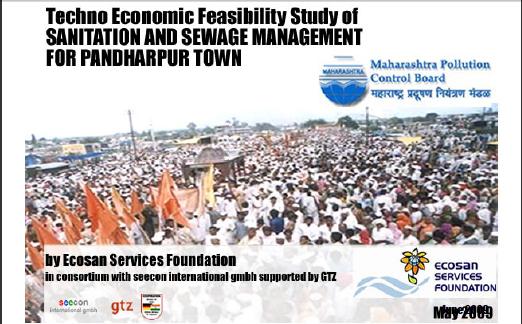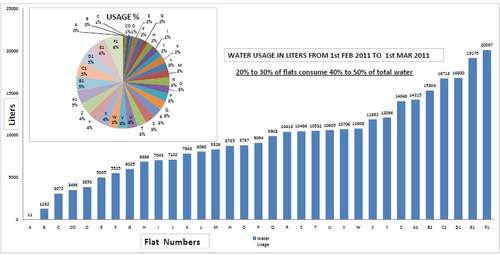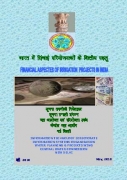/sub-categories/data
Data
Techno-economic feasibility study of sanitation and sewage management for Pandharpur town, Maharashtra - Ecosan Services Foundation (2009)
Posted on 10 Apr, 2011 02:15 AM This study provides interventions to solving the sanitation crisis in the holy town of Pandharpur, situated on the banks of the Chandrabagha/Bhima river, in the state of Maharashtra, which receives more than 1.5 crore devotees annually. On any given day there are approximately 20,000 pilgrims in this Class B town. This vast floating population creates massive sanitation problems leading to environmental and hygiene issues. The study forms part of the Maharashtra State Pollution Control Board's 'Environmental Improvement Programme at Religious Places in Maharashtra' project.
This study provides interventions to solving the sanitation crisis in the holy town of Pandharpur, situated on the banks of the Chandrabagha/Bhima river, in the state of Maharashtra, which receives more than 1.5 crore devotees annually. On any given day there are approximately 20,000 pilgrims in this Class B town. This vast floating population creates massive sanitation problems leading to environmental and hygiene issues. The study forms part of the Maharashtra State Pollution Control Board's 'Environmental Improvement Programme at Religious Places in Maharashtra' project.
Domestic water usage analysis for a 32 flat apartment in Bangalore - Kannan Venkitachalam
Posted on 08 Mar, 2011 10:10 AM

Initially used to buy 3-4 tankers per day with limited supply of water like in morning 1.5hrs., Noon 1 hr & Night 1.5hrs for the last 11 to 12 months. Now we have 24 hrs water and buying only 2 tankers per day.
Groundwater Information System - Data on groundwater quality and level for all states of India from 2005-09 from the Central Groundwater Board
Posted on 14 Feb, 2011 12:45 PM
Steps to access the data:
Financial aspects of irrigation projects in India – A report by the Central Water Commission
Posted on 13 Feb, 2011 08:28 AM This publication by the Central Water Commission presents data on Major and Medium Irrigation and Multipurpose projects, Minor Irrigation projects, Command Area Development scheme as available in the Finance A
This publication by the Central Water Commission presents data on Major and Medium Irrigation and Multipurpose projects, Minor Irrigation projects, Command Area Development scheme as available in the Finance A
Private water supply, sanitation and hydropower projects and reforms projects involving privatisation and commercialisation in India - Database by Manthan Adhyayan Kendra
Posted on 31 Jan, 2011 11:16 PMThe database has been developed as a part of Manthan Adhyayan Kendra's engagement in comprehensive monitoring, research and analysis of policies, programs and projects relating to privatisation/commercialisation of water sector.
Yale University releases Environmental Performance Indices for 2010
Posted on 30 Jan, 2011 11:47 PMThis website by the Yale University provides information on the global and countrywise ratings for environmental performance in the form of Environmental Performance Indices (EPI) for different countries. The site also provides details of EPI scores for India in comparison with the average scores globally.
This index was developed from the Pilot Environmental Performance Index, first published in 2002, and designed to supplement the environmental targets set forth in the U.N. Millennium Development Goals (http://en.wikipedia.org/wiki/Environmental_Performance_Index)
World Water Monitoring Day, 2010 - Neer Foundation organises water testing program in the northern states of India
Posted on 21 Jan, 2011 08:17 PMIndia is often referred as “The land of rivers”. For generations India has had a strong tradition of preserving water judiciously. Our forefathers were visionaries who had the wisdom of thinking ahead of future. They anticipated the growing population which would lead to an increased demand for water in the future. Like today we have civil engineers, hydrologists and architects, who have acquired knowledge through lesser known or prestigious Institutions, our ancestors carried with them the same inborn talent to preserve water, that too without any formal degrees. They were people of intellect and had great sense of developing natural water resources. In a total of about 6.5 lakh villages of the country, approximately 50 lakh ponds and other similar structures exist. Unfortunately, during the past two decades the water quality has deteriorated at a rapid pace. One of the major reasons for this is the untreated waste water reaching the water sources, turning them to be a dirty drain. The Ganga and the Yamuna, the two most sacred rivers of our country are no exception to it. This has been achieved though an association with the World Water Monitoring Day program last year.
2010: The year of climate records
Posted on 18 Jan, 2011 11:35 PMArticle Courtesy: Cognizant Reflections
Author: Sangeeta Deogawanka
The year 2010 has witnessed a few climate records that has mounted evidence of climate change the world over.
- It marked the end of the warmest decade since climate records were kept.
- It has been one of the three warmest years recorded, since 1850.
SRI - Less seeds, water , fertilisers lead to greater yields
Posted on 18 Jan, 2011 11:21 PMBHUBANESWAR, India, Dec 29, 2010 (IPS) - When French Jesuit priest and passionate agriculturist Henri de Laulanie developed the System of Rice Intensification (SRI) method of cultivation for Madagascar’s poor farmers in the 1980s, he probably had no idea that millions of farmers elsewhere in the world would one day benefit from it as well.